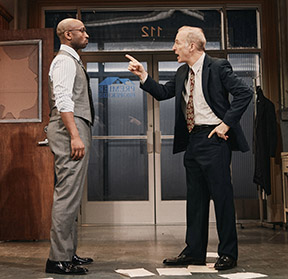By Lucy Komisar

David Mamet’s play, staged on Broadway in 1984, getting a revival with movie star Kieran Culkin, pits a collection of real estate salesman against each other as if they were in an MMA combat. (That is mixed martial arts, for the non-cognoscenti.) A punch here, a kick there, blood on the ground. That is to say that under Patrick Marber’s direction, it is overwrought, overacted and implausible. To switch metaphors, the office and inhabitants resemble a mental institution more than a tough, competitive real estate sales office. This forty-year old play doesn’t age well.
There’s nothing subtle about these scam artists who seem to get joy out of ripping off their marks. This little corner of cut-throat capitalism is almost surreal. It’s surprising there’s no physical violence to go with the repeated screaming of the F word. The pace is so fast that you may not stop to think about the logic of events.
Shelley Levene (Bob Odenkirk) who has been desperate at not making sales, comes in exulting that he sold eight units to a couple, telling all the details, including eating the wife’s store-bought crumb cake. After the rant is repeated to the point of boredom, John Williams (Donald Webber Jr.) who controls the men’s leads, tells him something the office already knows about the couple. Why didn’t Shelley know that? Not plausible.
The leads are the weapons the men use to attack prospects. (The verb is well chosen.) They are given out sparingly and as rewards by Williams. A night-time theft of the lead files dominates the play. We know early on who has filched them.
The fast pace blocks second thoughts about the dénouement. Williams, who runs the office, tells a perturbed client, James Lingk (John Pirruccello), who wants to cancel his deal to buy real estate he was psychologically bludgeoned into by hotshot salesman Richard Roma (Culkin), that the contract and check went to the bank the day before. (Lingk’s wife has ordered him to cancel the contract.) When the mark leaves, George Aaronow (Michael McKean), secretly in on the heist, remonstrates with Williams for making up a story rather than supporting Roma to save the deal.
Why would Williams say the contract was sent? Why would George say that that wasn’t true? How would he know? It gives Mamet a way to solve the ending but it’s not plausible.
A pot boiler.
“Glengarry Glen Ross.” Written by David Mamet, directed by Patrick Marber. Palace Theatre 160 West 47th St, NYC. Runtime 1hr45min. Opened March 31, 2025, closes June 28, 2025.



